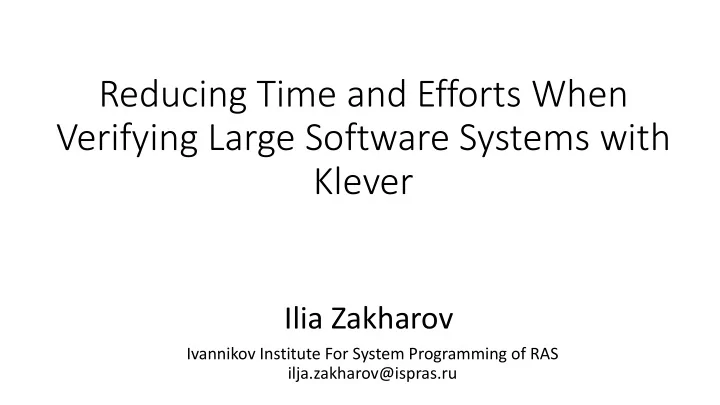

Reducing Time and Efforts When Verifying Large Software Systems with Klever Ilia Zakharov Ivannikov Institute For System Programming of RAS ilja.zakharov@ispras.ru
Klever Verification Framework Intended for finding bugs in large software systems using existing software verification tools • C programs • GNU C, Microsoft C • x86, ARM • > 200 KLOC • Requirements supported by software verification tools used as backends • Memory safety • Data races • API usage • Deliver both results and a program-adapted tool • Coverage reports, error traces and results of bugs triage • A tool to check regressions or reproduce results 2
Development • Implement program-specific parts in the framework • Prepare models and Workflow specifications Verification • Find bug • Deliver the tool and results 3
Klever Verification Framework Source Program Decomposition Code Environment Modeling Requirements Modelling Verification Bugs Results Assessment or Proofs 4
Source Code Preparation 5
Goals • Limit scope to specific components, source code versions, architectures • Prepare requirements • Plan development stages • Find bugs or prove correctness • Deliver results or a tool 6
Prepare Build Base Build System Source Code Executables Clade and CIF Build Base 7
Program Decomposition 8
Program Decomposition • Reduce environment modelling efforts • Prevent timeouts • Get rid of unsupported code Fragment I Fragment II Lib 1 Lib 2 Lib 3 Compone Component 2 nt 1 9
Extract Components as Fragments 1. Determine logical components • With unique interface • With common interface 2. Separate libraries 3. Remove auxiliary or irrelevant parts • Debug • Tests 10
Manual or Automatic Decomposition • Define fragments explicitly in Driver1.c Driver2.c advance • Develop algorithms to decompose 3 4 3 the program using its build base lib1.c Helper.c 10 2 lib.c Core.c 11
Provide Environment Models 12
Kinds of Models Kind of a Model External Functions Common Model Undefined functions that init/uninit resources and influence the control flow Requirement Model Specific API that should be properly used by the fragment Environment Model Functions that call entry points and influence these calls Program Fragment Requirement Environment Model Model Common Model 13
Environment Model Component Program Lib 14
Interraction Scenarios 1 2 3 Component 5 4 Program 4 Lib 2 1 15
Intermediate Environment Model tty_alloc_driver (failed) tty_alloc_driver (success) put_tty_driver tty_register_driver (failed) tty_set_operations tty_register_driver (success) tty_unregister_driver moxa_open (failed) Activate/deactivate moxa_open (success) moxa_close moxa_write 16
Environment Model Generator Environment Model Program Fragment Specifications Scenario Model Builders Intermediate Environment Model Translator C Code 17
Environment Model Generator Environment Model Program Fragment Specifications Scenario Model Builders Provide specifications as templates Manually develop environment model Intermediate specifications Environment Model Select auxiliary function models Translator Adjust completeness of the environment model C Code 18
Provide Requirement Specifications 19
Requirement Specification int cnt = 0; int try_module_get( struct module * m) { ret = ldv_random_neg_int(); if (!ret) cnt++; return ret; } void module_put( struct module * m) { cnt--; } void ldv_check_final_state( void ) { ldv_assert(cnt==0); } 20
Requirement Specifications Development 1. Support an empty requirement to measure the coverage 2. Support memory safety and data race safety requirement specifications 3. Implement other requirement specifications 4. Develop tests for requirement models 21
Analyse Results 22
Verification Results • Error traces (witnesses) • Coverage reports • Logs • Resource consumption statistics 23
Development • Uncovered entry points • Complicated code • Classify fails Refinement Use cases • Marks and tags for errors and false positives • Regression tests Verification • Find bugs • Prepare final marks and tags 24
Evaluation 25
Manual Effort at Verification of Linux Device Drivers and Subsystems Serial device All device Subsystems Stage Total drivers (20KLOC) drivers(4MLOC) (1MLOC) Development of 0,25 man-months - 0,25 man-months 0,5 man-months decomposition (100 LOC Python) (100 LOC Python) (200 LOC Python) algorithms Development of 3 man-months - 0,5 man-months 3,5 man-months environment model (3 KLOC Python) (500 LOC Python) (3,5 KLOC Python) builders Development of 4,5 man-months 5,5 man-months - 10 man-months environment model (7 KLOC DSL) (10 KLOC DSL) (17 KLOC DSL) specifications Development of 6 man-months 9 man-months 0,25 man-months 15,25 man-months requirement (550 LOC DSL) (950 LOC DSL) (200 LOC DSL) (1500 LOC DSL) specifications Total 13,75 man- 14,5 man-months 1 man-month 29,25 man-months months 26
BusyBox Applets Verification Stage Efforts Development of 0,25 man-months decomposition (100 LOC Python) algorithms Development of 0 man-months environment model - builders Development of 0,25 man-months (200 LOC DSL) environment model specifications Development of 0,5 man-months requirement (300 LOC DSL) specifications Total 1 man-month 27
Why do you care • Another point of view • Train your verification tool • Get new verification tasks 28
Thank You! https://github.com/ldv-klever/klever - Mirror https://forge.ispras.ru/projects/klever - Issue tracker https://github.com/17451k/cif - CIF https://github.com/17451k/clade - Clade http://linuxtesting.org/kernel - Other links and verification projects 29
Build Base • Various information about the program • Source code • Build command graph • File dependencies graph • Callgraph • … • Easy to access • Movable archive with all sources and data • Python API to access the data 30
Summary Decomposition Environment Requirement Analyzing results Modeling Specifications Development Manually prepared Coarse model Empty requirement Code coverage decomposition without restrictions specification Development Decomposition Scenario model Requirement Code coverage, algorithms builders specifications, marks, tags common model Algorithms to verify Environment model Requirement Code coverage, libraries specifications, tests specifications, marks, tags Refinement common model, tests - - Common model Code coverage, Verification marks, tags 31
Verification Time Verification Job 2 physical cores 4 physical cores 30 * 4 physical cores Serial device drivers (30KLOC) 5h 2.7h 0.5h All device drivers (3MLOC) 600h 195h 11h 32
Recommend
More recommend